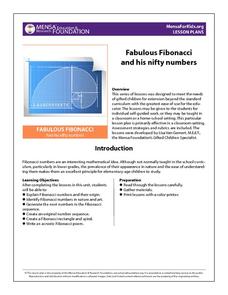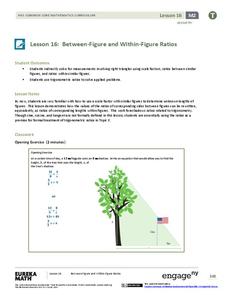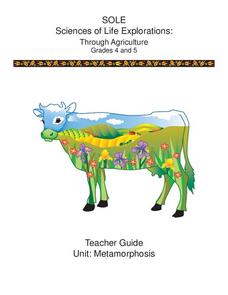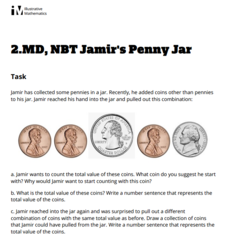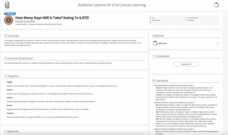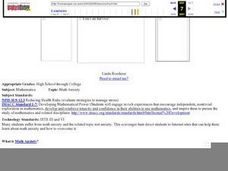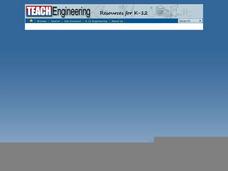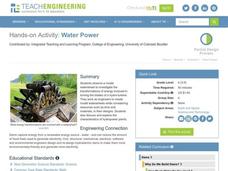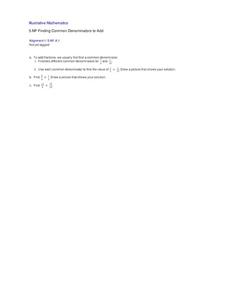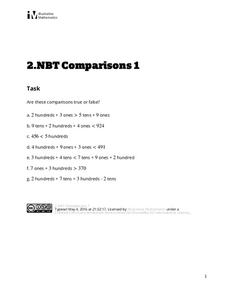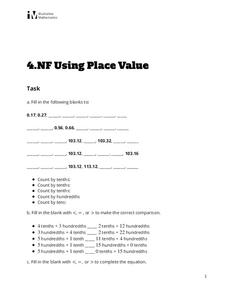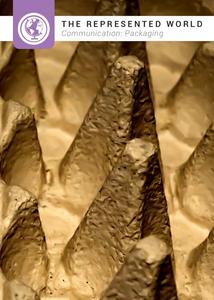MENSA Education & Research Foundation
Fabulous Fibonacci and His Nifty Numbers
Fibonacci numbers are not only found in the classroom but also in nature. Explore the concept of Fibonacci numbers through a series of lessons designed to gain insight into the mathematical reasoning behind the number pattern, and spark...
EngageNY
Between-Figure and Within-Figure Ratios
Tie the unit together and see concepts click in your young mathematicians' minds. Scholars apply the properties of similar triangles to find heights of objects. They concentrate on the proportions built with known measures and solve to...
Cornell University
Metamorphosis
Looking for an insect unit that addresses multiple skill strategies? Young entomologists explore multiple life cycles of insects that go through metamorphosis. The brainteasers and mobile activity spark learner interest before guiding...
EngageNY
Why Are Vectors Useful? 1
How do vectors help make problem solving more efficient? Math scholars use vectors to represent different phenomenon and calculate resultant vectors to answer questions. Problems vary from modeling airplane motion to the path of a robot.
EngageNY
Solving Equations Involving Linear Transformations of the Coordinate Space
Explore methods for solving linear systems with your classes and introduce learners to using matrices as a viable method. Scholars are able to recognize situations where matrices are the efficient method of solving. Application questions...
Balanced Assessment
Catenary
Develop a model for a hanging chain. Pupils find a mathematical model for a hanging chain and then they compare their models to the precise function that models the curve. Scholars come up with a strategy to determine how close their...
EngageNY
Converse of the Pythagorean Theorem
Discover a new application of the Pythagorean Theorem. Learners prove and apply the converse of the Pythagorean Theorem in the 17th lesson in a 25-part series. The examples ask learners to verify right triangles using the converse of the...
Illustrative Mathematics
Jamir's Penny Jar
Before you start counting the coins in Jamir's coin jar, figure out which coin to start with. Should it be the penny or the quarter? Why? This is the focus around a worksheet that works well as an assessment on counting money and...
K20 LEARN
How Many Days Will It Take? Eating To 6,972!: Partial Quotients
The story, How Many Jelly Beans? by Andrea Menotti introduces a instructional activity about partial quotients. Mathematicians practice rounding and multiplying, then work in small groups to connect those skills with division and partial...
Curated OER
You Can Survive! (Math Anxiety)
Students explore strategies to manage stress in the math classroom. Through various activities, students discover the characteristics of math anxiety and determine if this affects them. Using computer technology, students complete a...
Curated OER
Sunshine Math 3
In this word problems learning exercise, learners read and problem solve nine mathematical word problems involving grids, measurement, compensation and angles.
Teach Engineering
Both Fields at Once?
An MRI uses both a magnetic and electricity, so how do the two interact with each other? Class members observe the effects on a charged particle when it is subject to both an electrical and magnetic field. The teacher background...
Curated OER
Algebra Tic-Tac-Times
Use the strategy of working backwards to practice factoring polynomials and multiplying binomials in a game format. Play, and work to find which products combined with the available factors will result in the placement of four tokens in...
Curated OER
Chairs Around the Table
Youngsters become flexible problem solvers with this challenging lesson. If there are 24 square tables in a restaurant, how many customers can be seated at one time? They can use manipulatives or draw pictures to help them find the...
Teach Engineering
Water Power
Young hydrologists observe a waterwheel which helps them investigate the transformations of energy that occur when the blades of a hydro-turbine are turning. They work together in pairs and pretend to be engineers who are building a new...
Illustrative Mathematics
Finding Common Denominators to Add
Finding common denominators is an important strategy when adding fractions with unlike denominators. In the first two questions in this three-question task, fifth graders are asked to combine fractions and draw a picture to show their...
Curriculum Corner
7th Grade Math "I Can" Statement Posters
Translate the Common Core math standards into a series of achievable "I can" statements with this collection of classroom displays. Offering posters for each standard, this resource is a great way to support your seventh graders as they...
Illustrative Mathematics
Running Around a Track II
On your mark, get set, GO! The class sprints toward the conclusions in a race analysis activity. The staggered start of the 400-m foot race is taken apart in detail, and then learners step back and develop some overall race strategy and...
Computer Science Unplugged
Twenty Guesses—Information Theory
How do we determine how much information to include and what can be left out? By playing a game of 20 questions, the class generates the best strategies for finding a number. They then move on to guessing the next letter in a short...
Willow Tree
Order of Operations
It's the classic please excuse my dear aunt sally strategy to remembering the order of operations. Young mathematicians practice to develop an understanding of the order of operations. Examples and practice problems include absolute...
Balanced Assessment
Fermi Area
Discover creative ways to use surface area formulas. In the assessment task, scholars apply estimation strategies to determine surface area in non-routine problems. They consider surface area of kitchen sponges, rock salt crystals, and...
Illustrative Mathematics
Comparisons 1
A seven question worksheet asks learners to use place value strategies to decide if each number comparison is true or false.
Illustrative Mathematics
Using Place Value
Learners count by tenths, hundredths, or tens in a task that uses decimal place value strategies. The young mathematicians then use <, >, or = to make correct comparisons between expanded decimal notations.
Indiana Department of Education
The Represented World: Communication—Packaging
Challenge your classes to design and market a new product. Collaborative groups use geometry skills to create packaging for their products. Finally, they plan a marketing strategy to present to a marketing specialist.


